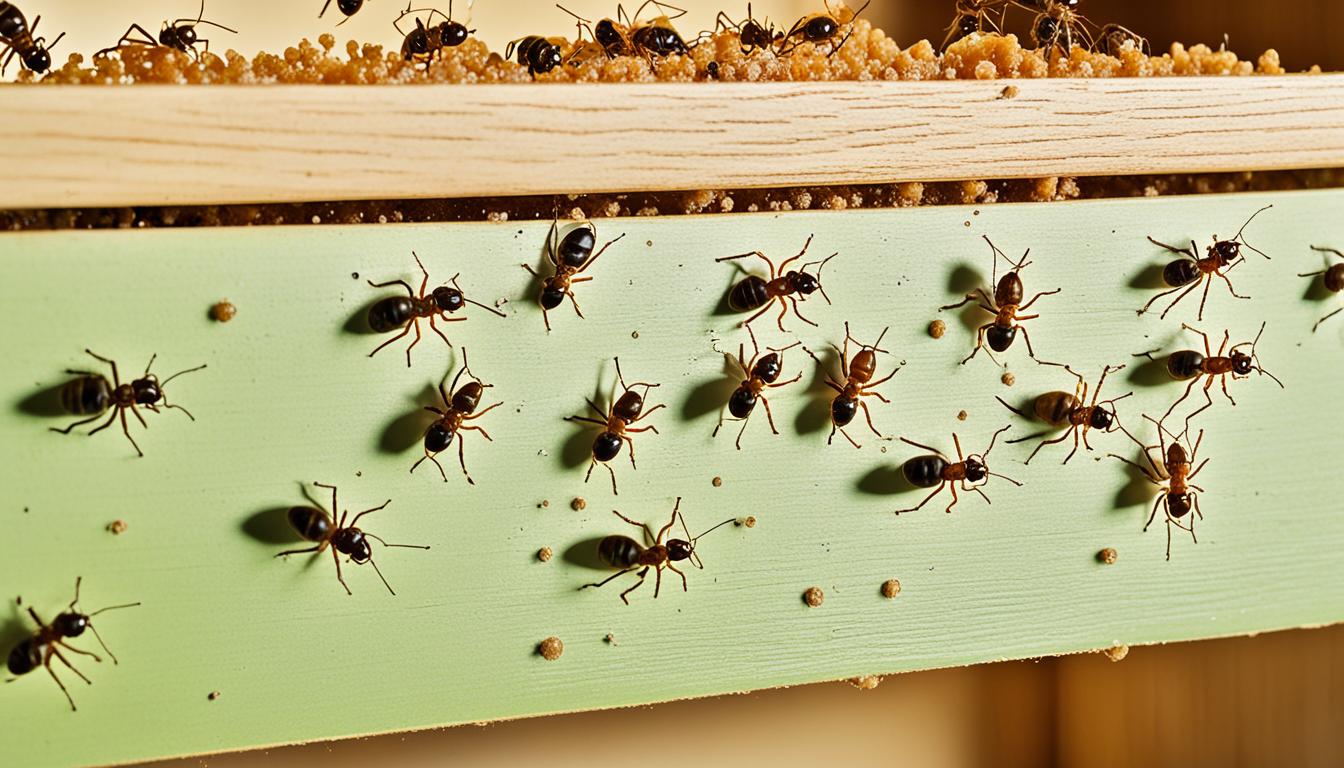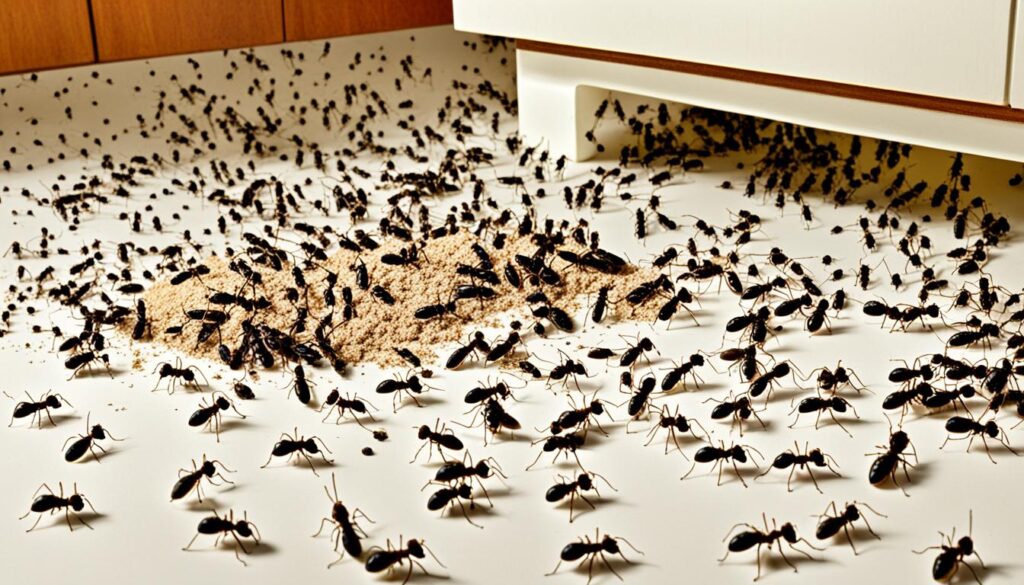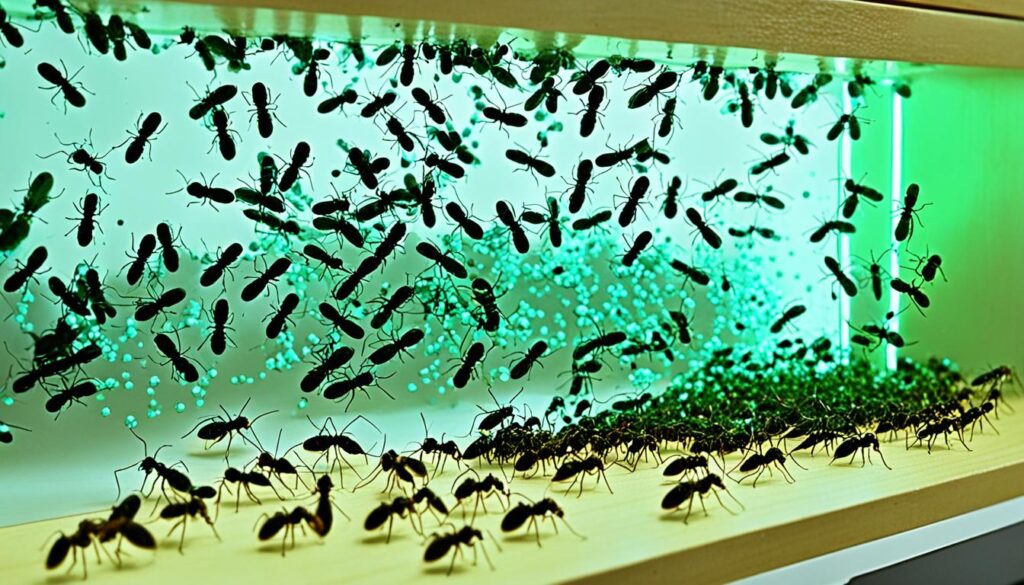
Ant Invasion: Causes of Ants in Your Cabinets
Welcome to our informative article on the causes of persistent ant infestations in your kitchen cabinets. If you have ever experienced the frustration of finding ants crawling around your food storage areas, you know how important it is to understand why these pests keep invading your cabinets.
Ant invasion is a common issue faced by many homeowners, and it can be a persistent problem if not addressed properly. In this section, we will explore the reasons behind ant infestations in kitchen cabinets, shedding light on the factors that attract ants to this specific area of your home.
Key Takeaways:
- Ant infestations in kitchen cabinets can be a frustrating problem that requires proper understanding and preventive measures.
- By addressing the causes of ant attraction to cabinets, you can effectively eliminate and prevent future ant infestations.
- Maintaining cleanliness, properly sealing food containers, and promptly cleaning up spills and crumbs are essential in minimizing ant presence in your cabinets.
- Using natural ant repellents or seeking professional assistance for pest control can be effective strategies in managing ant invasions.
- By implementing preventive measures and taking proactive steps, you can keep your kitchen cabinets ant-free and maintain a pest-free environment in your home.
Understanding Ant Behavior and Attraction to Cabinets
In this section, we will explore the reasons why ants are attracted to kitchen cabinets and provide effective strategies for getting rid of ants in cabinets and preventing future infestations. Understanding ant behavior is key to implementing successful kitchen pest control measures.
Ant Behavior: Searching for Food and Shelter
Ants are naturally drawn to areas where they can find food and shelter. Kitchen cabinets provide an ideal environment for ants as they offer both a potential food source and a safe space to build their nests.
Ants are highly skilled in detecting the scent of food, even in minuscule quantities. They leave chemical trails for other ants to follow, leading them to the source of food. Once they discover a reliable food supply in your cabinets, they will continue to return until the source is eliminated.
Getting Rid of Ants in Cabinets
To effectively get rid of ants in your kitchen cabinets, it is necessary to target both the visible ants and their colony. Here are some strategies to consider:
- Clean and sanitize: Thoroughly clean your cabinets, removing any food residue or spills that may attract ants. Use soapy water or a mild cleanser to wipe down the interior surfaces.
- Seal gaps and cracks: Ants can enter cabinets through tiny openings. Seal any gaps or cracks with caulk to prevent their entry.
- Use ant bait: Ant baits are an effective way to target the entire ant colony. Place ant bait stations near the cabinets, following the manufacturer’s instructions carefully.
- Apply natural remedies: Consider using natural ant repellents, such as vinegar, lemon juice, or peppermint essential oil. These substances are known to repel ants and can be safely applied to cabinets.
- Consult a professional: If your ant infestation persists despite your efforts, it may be wise to seek the help of a professional pest control service. They can assess your situation and provide targeted treatments to eliminate the ant problem.
Preventing Ants in Kitchen Cabinets
Preventing ants from infesting your kitchen cabinets is essential to maintaining a pest-free environment. Here are some preventive measures you can take:
- Keep your kitchen clean: Regularly clean your kitchen, paying attention to spills, crumbs, and food residue. Wipe down countertops, sweep the floors, and mop regularly.
- Store food properly: Seal food containers tightly to prevent ants from accessing them. Avoid leaving open food containers in your cabinets as they can attract ants.
- Repair leaks and drips: Ants are also attracted to moisture. Repair any leaks or drips in your kitchen to eliminate potential water sources that may attract the pests.
- Trim vegetation: Ants can use branches or shrubs touching your home as bridges to access your cabinets. Trim back vegetation and ensure there is a clear gap between plants and your house.
- Secure garbage cans: Make sure your garbage cans are tightly sealed to prevent ants from being drawn to the smell of food waste.
By implementing these preventive measures and taking proactive steps to eliminate ants in your kitchen cabinets, you can effectively control kitchen pest infestations and maintain a clean, ant-free environment.

Identifying Common Causes of Ant Infestations in Cabinets
In this section, we will explore the common causes of ant infestations in kitchen cabinets. Understanding these causes is key to taking proactive steps in eliminating ants from your cabinets and preventing their return. Let’s dive in:
Food Crumbs and Spills: Food remnants left behind in cabinets can attract ants. Even the tiniest crumbs or spills can be enticing to these pests. It’s crucial to keep your cabinets clean and free from any food debris to minimize ant activity.
Inadequate Sealing of Food Containers: Improperly sealed food containers provide easy access for ants. These sneaky insects can detect even the smallest openings and make their way into your cabinets. Make sure to properly seal all food containers to prevent ants from gaining entry.
Structural Issues: Ants can find their way into cabinets through small cracks, gaps, or openings in the structure. It’s vital to identify and seal any openings to eliminate potential entry points for ants.
Moisture: Excessive moisture or water leaks in cabinets can attract ants, as they need water to survive. Fix any leaks promptly and ensure that your cabinets remain dry to discourage ant infestations.
Tip: Maintaining a clean and dry kitchen environment is essential in preventing ant infestations in cabinets.
By addressing these common causes, you can effectively eliminate ants from your kitchen cabinets and prevent their return. Remember to maintain cleanliness, proper food storage, and address any structural or moisture issues in your kitchen. Taking these proactive measures will help you keep your cabinets ant-free.
Comparing Natural Ant Repellents and Chemical Solutions
| Natural Ant Repellents | Chemical Solutions |
|---|---|
| Safe for humans and pets | Potential health risks |
| Environmentally friendly | Potential negative impact on the environment |
| May require more frequent applications | Long-lasting effectiveness |
| Less aggressive on ants | Stronger and faster elimination of ants |
When choosing between natural ant repellents and chemical solutions, consider the trade-offs between safety, environmental impact, duration of effectiveness, and the level of aggression towards ants. Ultimately, the choice depends on your preferences and the severity of the ant infestation.

In the next section, we will conclude our exploration of ant infestations in kitchen cabinets and provide key takeaways to help you maintain an ant-free kitchen environment.
Conclusion
Ants are commonly attracted to kitchen cabinets where they find an abundant food supply and potential shelter. To prevent ant infestations, it is essential to uphold a clean and organized kitchen environment. Regularly cleaning up spills and crumbs is crucial as ants are highly attracted to these food sources. Additionally, properly sealing food containers can help minimize their accessibility to ants.
Using natural ant repellents is another effective strategy to deter ants from invading your cabinets. Products containing essential oils such as peppermint or lemon can act as natural repellents. However, if the infestation persists or becomes severe, seeking professional assistance for pest control is recommended.
By addressing the underlying causes of ant attraction and implementing preventive measures, you can maintain ant-free kitchen cabinets and ensure a pest-free environment in your home.




